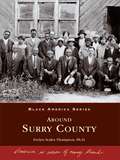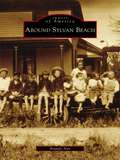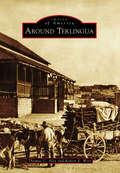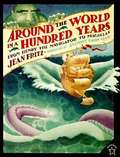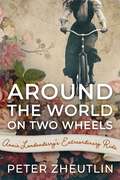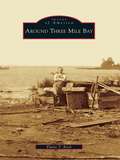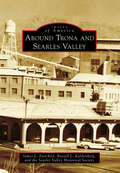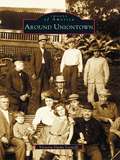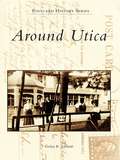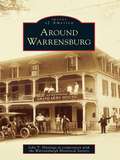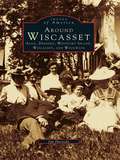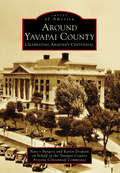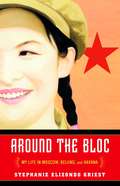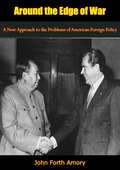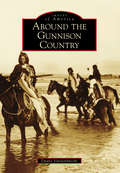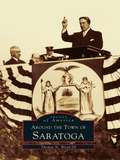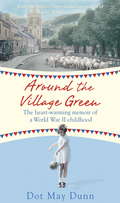- Table View
- List View
Around Surry County (Black America Series)
by Evelyn Scales ThompsonFrom slavery in the 1800s to freedom in the 1950s, Black America Series: Around Surry County traces the footsteps of African Americans through their transition from house servants and field hands to land owners, farmers, andsuccessful small business proprietors. This detailed pictorial history celebrates and honors the strong faith, courage, and determination of the Surry County area's black community.
Around Swanzey: Swanzey, Ashuelot, Winchester, Richmond, Fitzwilliam, and Hinsdale (Images of America)
by Pamela Apkarian-RussellNestled against the Massachusetts and Vermont borders are six New Hampshire communities largely unconnected with the rest of their home state. The picturesque bedroom and summer vacation communities of Swanzey, Ashuelot, Winchester, Richmond, Fitzwilliam, and Hinsdale all developed from industrial or agricultural economies, although this fact is less than apparent today. The factories have nearly all vanished, and so has the extreme wealth and glamorous lifestyle of former residents like playwright Denman Thompson. Routes 10 and 12 are still the main roads that connect these towns, however, and the Ashuelot River is slowly recovering from years of pollution in a return to its pure and natural state. In fact, the area's Old Homestead persona seems to have experienced a revival in recent years in the absence of major industry, and it becomes more and more important for residents and tourists alike to be reminded of the area's nineteenth-century economic development.
Around Sylvan Beach (Images of America)
by Brandy AnnOn the sandy shores and calm waters of Oneida Lake rests Sylvan Beach. For many years, the entire region was simply known as Fish Creek, and it was settled by George Haskins in the early 1800s. When the Erie Canal was completed in 1825, the area began to flourish. James D. Spencer arrived in the hamlet of Fish Creek in the 1840s and settled near Wood River and the Oswego Midland Railroad station. In the 1870s, he began to develop the sandy shores along Oneida Lake, and the first visitors to Spencer's Grove arrived in August 1878. Sylvan Beach received its name in the spring of 1886, when the New York, Ontario and Western Railroad built a loop into Spencer's Grove. Sylvan Beach continued to thrive with the addition of the railway station, allowing the shipment of produce and lumber as well as the arrival of large numbers of vacationers. These vintage images chronicle the history of Sylvan Beach and its surrounding communities, illustrating the region's strong link to the vast history of America.
Around Terlingua
by Robert E. Wirt Thomas C. AlexThe origin of the name "Terlingua" is obscure and lost in time. For the past century and a half, the area covered by the name has expanded to include numerous concentrations of people engaged to varying degrees in ranching, farming, and mining, or the support thereof. Farmers and ranchers produced agricultural products, woodcutters supplied timbers for the mines or fuel for the furnaces, and storekeepers supplied the goods needed for sustenance of this diverse community that was spread over much of south Brewster County in West Texas. Hispanic people who began settling the region in the 18th century were the backbone of the mining industry. Many of the families here today are descendants of the mine workers and continue contributing to the community. This story tells of the establishment and abandonment of Terlingua following the rise and decline in demand for mercury and how the ghost town was resurrected in the 20th century.
Around The World In A Hundred Years: From Henry The Navigator To Magellan
by Jean Fritz Anthony B. VentiJean Fritz brings history to life once again in 10 true tales of 15th-century European explorers -- from Bartholomew Diaz and Christopher Columbus to Juan Ponce de Leon and Vasco Nu'ez de Balboa -- who changed the map and left behind stories of adventure too good to miss
Around The World On Two Wheels: Annie Londonderry’s Extraordinary Ride (Playaway Adult Nonfiction Ser.)
by Peter ZheutlinPeter Zheutlin's thoroughly researched account will make you wish you'd been around to catch a glimpse of the extraordinary woman as she went wheeling by. --Bill Littlefield, National Public Radio's Only A GameUntil 1894 there were no female sport stars, no product endorsement deals, and no young mothers with the chutzpah to circle the globe on a bicycle. Annie Londonderry changed all of that. When Annie left Boston in June of that year, she was a brash young lady with a 42-pound bicycle, a revolver, a change of underwear, and a dream of freedom. She was also a feisty mother of three who had become the center of what one newspaper called "one of the most novel wagers ever made": a high-stakes bet between two wealthy merchants that a woman could not ride around the world on a bicycle. The epic journey that followed took the connection between athletics and commercialism to dizzying new heights, and turned Annie Londonderry into a symbol of women's equality. A vastly entertaining blend of social history, high adventure, and maverick marketing, Around the World on Two Wheels is an unforgettable portrait of courage, imagination, and tenacity. "Annie was a remarkable woman and well worth getting to know." --Booklist"A wonderful telling of one of the most intriguing, offbeat, and until now, lost chapters in the history of cycling." --David Herlihy, author of Bicycle: The History "A pleasant, affectionate portrait of a free spirit who pedaled her way out of Victorian constraints." --Kirkus Reviews"[A] charming and informative book." --Cape Cod Times"[An] incredible story. . .[a] fascinating book." --NextReads "[A] stirring tale. . .not only a must read, but a must have." --Western Writers of America Roundup Magazine"[A] remarkable saga." --The Winston-Salem (NC) Journal"[R]ead[s]. . .like a novel." --The Columbia (SC) State"[M]eticulously researched. . .illuminat[es] the feeling of a bygone era." --The Portsmouth (NH) Wire Peter Zheutlin has been chasing the story of his great-grandaunt Annie Londonderry for more than four years. He is an avid cyclist and a freelance journalist whose work appears regularly in the Boston Globe and the Christian Science Monitor. He has also written for the New York Times, the Los Angeles Times, the Washington Post, AARP Magazine, Bicycling, the New England Quarterly, and other publications. He lives in Needham, Massachusetts.
Around Three Mile Bay (Images of America)
by Elaine T. BockThree Mile Bay, located just below the Canadian border in the town of Lyme, was settled between 1810 and 1820. Early immigrants from Canada and Europe were drawn by the abundance of water-powered mills and factories along the area's waterways. At the mouth of Three Mile Creek stood the sawmill of Peter and Richard Estes, built in 1820; from 1860 to the 1900s, limestone quarried in the Three Mile Bay area was known for its superior quality. Resident Asa Wilcox built 48 brigs, propellers, schooners, and other seafaring vessels from 1835 to 1853, some ultimately joining the approximately 500 shipwrecked vessels now resting at the bottom of Lake Ontario. Fishing and selling potash were often carried on by farmers as side ventures. When loads of potash, and occasionally wheat, were hauled to Albany, on the return trip merchandise was brought back to be sold in local stores. For generations, families developed their trades and helped to sustain the hard-working people of the hamlet of Three Mile Bay.
Around Trona and Searles Valley
by Russell L. Kaldenberg James L. Fairchild Searles Valley Historical SocietyTrona was once the most populous community in the Upper Mojave Desert. Originally explored by the Death Valley 49ers in 1850, Searles Valley was formed by remnants of the Owens River Lakes. The small towns of Borosolvay, Magnesium, Burnham, and Slaterange City prospered for a period before fading. Homewood Canyon, Westend, Argus, Pioneer Point, and Trona continue to provide pleasant housing for Searles Valley residents. The valley is dominated by mining history, and Searles Valley Minerals still produces products for worldwide markets. Wyatt Earp played cards and gambled at Poeville and was arrested in 1910 in Searles Valley for claim jumping. In 1913, Stafford Wallace Austin helped create the planned town of Trona. Amelia Earhart's husband, George Putnam, died at the Trona Hospital in 1950. Sit down and enjoy the jaunt through some of the most interesting history in the West.
Around Uniontown
by Victoria Dutko LeonelliOnce scattered with frontier forts and Native American paths, Uniontown has changed considerably since Henry Beeson, a Virginia Quaker, offered fifty-four lots for sale on July 4, 1776. Around Uniontown captures this history with nearly two hundred vintage images culled from personal collections and the Uniontown Public Library's archives. In these pages, revisit 1896, when Uniontown had its greatest patriotic festivity. View beautiful tree-lined streets with the magnificent homes of coal barons. Visit the "patch towns," and meet the people who lived and worked during the booming coal and coke era. Witness the sensational Polly Williams murder trial, and learn about some of the unique individuals who have called Uniontown home, such as Gen. George C. Marshall, David Blythe, and "Crazy Billy."
Around Utica (Postcard History Series)
by Evelyn R. EdwardsAround Utica features the work of A. J. Manning, who traveled with his camera through picturesque central New York in the early 1900s. Manning recorded historic events, such as Sherman Notification Day in 1908, honoring William Howard Taft's vice presidential nominee James Schoolcraft Sherman; catastrophes, such as the fires at Utica Free Academy and the YMCA; and nostalgic scenes of everyday life. His images were produced in small quantities as real-photo postcards, which today are quite rare and much sought after by collectors.
Around Walterboro, South Carolina
by Sherry J. CawleyWalterboro is a city of beautiful, living memories, with Old South plantations dotting its surrounding countrysides and peaceful scenes graced by Spanish moss swaying gently from hundred-year-old live oak trees. Established as a summer haven for rice planters from lower Colleton County in 1784, Walterboro served a similar purpose from the 1920s to the 1950s, when it was "The Place" to stop for anxious vacationers making the trek from New York to Florida. Around Walterboro hopes to recapture those earlier days when Walterboro's main commercial ingredients were made up of family-owned businesses located along two-lane highways instead of today's chain motels and fast food restaurants stationed along the exits on expressways. This volume allows the reader to walk down dusty, shady country roads, examine the exteriors and explore the interiors of some of Colleton County's most historic buildings, and stroll along the avenues of downtown Walterboro and the beaches of Edisto Island.
Around Warrensburg (Images of America)
by John T. Hastings Warrensburgh Historical SocietyWilliam Bond became the first Warrensburg settler, when he arrived in the Echo Lake area, in 1787. Shortly thereafter, Warrensburg became known as "the Bridge" because it was the location of the only bridge in the area that crossed the Schroon River. In February 1813, the town of Warrensburg was formed from part of Thurman. By the mid-1800s, A. C. Emerson and B. P. Burhans had moved to Warrensburg and begun to harness the waterpower of the Schroon River and utilize the nearby timber resource. The Emerson sawmill and Burhans's tannery and gristmill provided employment and capital to support a growing and thriving town. Other industries, such as a woolen mill and pants factory, sash and blind factory, shirt factory, and shoe peg factory, soon followed. With the dawn of the 20th century, improved transportation in the form of railroads and the automobile began bringing more people to Warren County. This trend continues today as numerous visitors summer in the Adirondacks to enjoy the clean air and water of the north country.
Around Westhampton
by Meredith MurrayRenowned as part of the Hamptons, the area known today as Westhampton, Westhampton Beach, Quiogue, and West Hampton Dunes was named Catchaponack by the Algonquin tribes who lived in the area when the English sheepherders arrived in the 1660s. A land of breathtakingly beautiful beaches and bays situated on the south shore of Long Island, just 65 miles east of New York City, Westhampton has evolved from an agricultural and fishing village to a summer vacation resort to a year-round oceanfront community. Fortune 500 chief executive officers and celebrities, such as Cary Grant, Charles Addams, and Marvin Hamlisch, have lived quietly amid locals. Together they have survived hurricanes, outlasted raucous night clubs, rebuilt eroded dunes, and fought off real estate developers. Around Westhampton depicts how an area blessed with uncommon physical beauty has managed to remain unspoiled in the face of natural disasters and international fame.
Around Wiscasset: Alna, Dresden, Westport Island, Wiscasset, and Woolwich (Images of America)
by Jim HarnedyThe Kennebec and Sheepscot Rivers of Maine, naturalboundaries for the Wiscasset region, provided the water highways for early explorers, traders, andmissionaries. By the early part of the seventeenth century, colonization by European settlers had begun. For over 360 years, the area has been home to shipbuilders, fishermen, farmers, and tradesmen. This marvelous photographic chronicle traces not onlythe rich historical traditions of the area, but also the shared sense of life's unbroken continuity present in the towns of the Wiscasset region: Alna, Dresden, Westport Island, Wiscasset, and Woolwich. Vintage photographs profile a few of those who quietly inspired others through their efforts to make life better in the region, as well as those men and women of wealth and vision who provided the area with a legacy by their lifestyles and great homes. The book also features views of local taverns, courthouses, general stores, churches, and schools--all the foundations of a changing, vivacious, and growing community.
Around Yavapai County: Celebrating Arizona's Centennial
by Nancy Burgess Karen Despain Yavapai County Arizona Centennial CommitteeOn February 23, 1863, Pres. Abraham Lincoln signed the bill creating the Territory of Arizona. The first Arizona Territorial Legislature established the capital at Prescott and met in September 1864. They divided the territory into four counties: Mohave, Pima, Yavapai, and Yuma. Yavapai County, the "mother county," consisted of approximately 65,000 square miles and was believed to be the largest county in the United States. By the time Arizona attained statehood on February 14, 1912, there were 14 counties, and Yavapai County had been reduced in size to 8,125 square miles. Yavapai County has a rich history in mining, ranching, farming, military, and business. Today, Yavapai County is a thriving, growing county with nine incorporated cities and towns and numerous unincorporated communities, such as Ash Fork, Black Canyon City, Cornville, Mayer, and Skull Valley. Historic sites include Sharlot Hall Museum in Prescott, the town of Jerome, Fort Verde, Montezuma's Castle and Well, and Tuzigoot.
Around the Bloc: My Life in Moscow, Beijing, and Havana
by Stephanie Elizondo GriestDesperate to escape South Texas, Stephanie Elizondo Griest dreamed of becoming a foreign correspondent. So she headed to Russia looking for some excitement-- commencing what would become a four-year, twelve-nation Communist bloc tour that shattered her preconceived notions of the "Evil Empire." In Around the Bloc, Griest relates her experiences as a volunteer at a children's shelter in Moscow, a propaganda polisher at the office of the Chinese Communist Party's English-language mouthpiece in Beijing, and a belly dancer among the rumba queens of Havana. She falls in love with an ex-soldier who narrowly avoided radiation cleanup duties at Chernobyl, hangs out with Cuban hip-hop artists, and comes to difficult realizations about the meaning of democracy.
Around the Corner to Around the World: A Dozen Lessons I Learned Running Dunkin Donuts
by Robert RosenbergLearn twelve key lessons from Dunkin&’ Donuts former CEO Robert Rosenberg that offer critical insights and a unique, 360-degree perspective to business leaders and managers on building one of the world&’s most recognized brands.For entrepreneurs fighting for survival and leaders in growing businesses facing critical strategic decisions, competition is always fierce, and the future is never certain. Throughout all the chaos and the noise, you need a mentor that has seen a business through the ins and outs and can offer guidance that will exponentially tip the odds in your favor to succeed.Robert Rosenberg took over as CEO of Dunkin&’ Donuts in 1963, 13 years after the first restaurant was founded by his father, William. In his remarkable 35-year run, he grew the company from $10 million in sales to over $2 billion, with more than 3,000 outlets. Through his tenure, Robert learned important lessons on running and scaling a family business.In Around the Corner to Around the World, Rosenberg shares his insider perspective on all the dramatic highs and lows that are part of the Dunkin&’ Donuts story to guide you to your own success story.Around the Corner to Around the World: Distills the characteristics of a successful company through all phases of growth. Provides a new perspective on the dramatic story behind the rise of one of the world&’s most iconic brands.Tells the first-hand account (including essential lessons learned) from the tenure of one of the most successful CEO runs in modern business history.Reveals some of the dramatic and surprising plot turns in the story of Dunkin&’s rise to global prominence.
Around the Cragged Hill: A Personal and Political Philosophy
by George F. KennanWinner of the National Book Award and two Pulitzer Prizes, diplomat and scholar Kennan now steps forth with a compelling, provocative testament for our times -- a brilliant look at the problems facing America today.
Around the Edge of War: A New Approach to the Problems of American Foreign Policy
by John Forth AmoryWith Around the Edge of War: A New Approach to the Problems of American Foreign Policy, John Forth Amory wrote a thought-provoking book examining several approaches to United States foreign policy. A Washington expert at the time of first publication in 1961, Amory was critical of the tendency in Washington to “over-think” a problem, and advocated a return to Jeffersonian principles as a beginning in the search of reasonable alternatives to present policy.“Our primary purpose is to help Americans think about our foreign policy as a whole, about how it is made, whence derived, and whether it has been right or wrong in terms of the whole national interest and pragmatically in terms of results. We want especially to lead Americans to think of people, of men, women and children; for we believe that in this period of military stalemate the only remaining weapons that can be used, for or against us, are the people of the earth, whom Jefferson defined as the only legitimate source of power—the great majorities who, after millennia, are coming into their own. We think that the safety of the United States, the moral health of the American people and the survival of our national freedoms depend on whether we go with this swelling tide of people or against it.”—John Forth Amory, Foreword
Around the Gunnison Country (Images of America)
by Duane VandenbuscheThe Gunnison country, 4,000 square miles of high valleys, heavy snows, deep canyons, and 14,000-foot-high mountains, is one of Colorado's most beautiful regions. Located on the Western Slope of Colorado, the Gunnison country has a long history involving Native Americans, mining, narrow-gauge railroads, ranching, Western State Colorado University, and recreation. The region has also been influenced by nearby Lake City in the San Juan Mountains, Aspen in the Elk Mountains, and towns on the east side of the famed and historic Alpine Railroad Tunnel. Today, the Gunnison country still is beautiful and tranquil, hosting nearly 2,000,000 visitors yearly while remaining much the same as it was over 125 years ago.
Around the Town of Saratoga
by Thomas N. Wood IIIAs the American struggle for independence intensified, Saratoga became a focal point of warring activities. Both colonists and loyalists maintained forts, camps, and officer headquarters within town. In 1777, after the two Battles of Saratoga, American forces gained the surrender of BritishGen. John Burgoyne, thus turning the tide of the Revolutionary War. The name Saratoga comes from the Mohawk word meaning either "place of the swift water" or "hillside country of the great river." True to its name, the town spreads across rolling hills along the western side of the Hudson River. The river itself, together with two early main roads and a canal, brought prosperity to the area. Saratoga became a major shipping terminal. The town boundaries changed several times throughout the years, but the rural character of the town and the spirit of its residents remained constant.
Around the Village Green: The Heart-Warming Memoir of a World War II Childhood
by Dot May DunnIt's 1939 and little Dot May Dun is playing with her brothers in the quiet lanes of their Derbyshire village. The grown-ups' talk of war means very little to Dot but things are starting to change in the village, for good. When a prisoner of war camp is built close to Dot's village, and a Yankee base is stationed nearby, Dot makes friends with the most unlikely of soldiers. But her friendships are threatened when telegrams start to arrive in the village and the real impact of war bears heavily on this close-knit mining community. From little lives spring great tales. Dot's childhood memoir shares the universals of innocence, love, loss and friendships. THE VILLAGE will move and entertain in equal measures.
Around the Village Green: The Heart-Warming Memoir of a World War II Childhood
by Dot May DunnThe heart-warming tale of a wartime childhood.It's 1939 and little Dot May Dun is playing with her brothers in the quiet lanes of their Derbyshire village. The grown-ups' talk of war means very little to Dot but things are starting to change in the village, for good.When a prisoner of war camp is built close to Dot's village, and a Yankee base is stationed nearby, Dot makes friends with the most unlikely of soldiers. But her friendships are threatened when telegrams start to arrive in the village and the real impact of war bears heavily on this close-knit mining community.From little lives spring great tales. Dot's childhood memoir shares the universals of innocence, love, loss and friendships. THE VILLAGE will move and entertain in equal measures.
Around the Village Green: The Heart-Warming Memoir of a World War II Childhood
by Dot May DunnIt's 1939 and little Dot May Dun is playing with her brothers in the quiet lanes of their Derbyshire village. The grown-ups' talk of war means very little to Dot but things are starting to change in the village, for good.When a prisoner of war camp is built close to Dot's village, and a Yankee base is stationed nearby, Dot makes friends with the most unlikely of soldiers. But her friendships are threatened when telegrams start to arrive in the village and the real impact of war bears heavily on this close-knit mining community.From little lives spring great tales. Dot's childhood memoir shares the universals of innocence, love, loss and friendships. THE VILLAGE will move and entertain in equal measures.Read by Joan Walker(p) 2014 Orion Publishing Group
Around the World Submerged
by Edward L. BeachWhen the nuclear-powered submarine USS Triton was commissioned in November 1959, its commanding officer, Captain Edward L. Beach, planned a routine shakedown cruise in the North Atlantic. Two weeks before the scheduled cruise, however, Beach was summoned to Washington and told of the immediate necessity to prove the reliability of the Rickover-conceived submarine. His new secret orders were to take the Triton around the world, entirely submerged the total distance.This is Beach's gripping firsthand account of what went on during the 36,000 nautical-mile voyage whose record for speed and endurance still stands today. It brings to life the many tense events in the historic journey: the malfunction of the essential fathometer that indicated the location of undersea mountains and shallow waters, the sudden agonizing illness of a senior petty officer, and the serious problems with the ship's main hydraulic oil system. Intensely dramatic, Beach's chronicle also describes the psychological stresses of the journey and some touching moments shared by the crew. A skillful story teller, he recounts the experience in such detail that readers feel they have been along for the ride of a lifetime.
